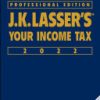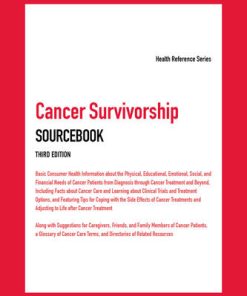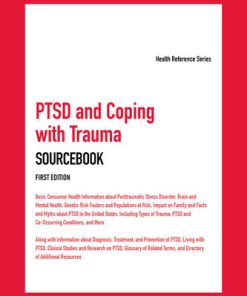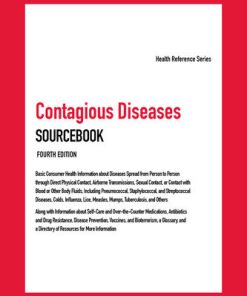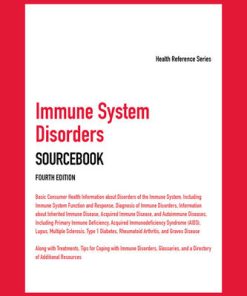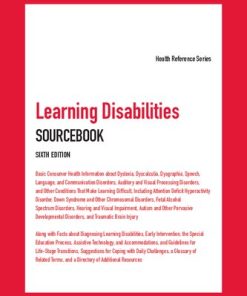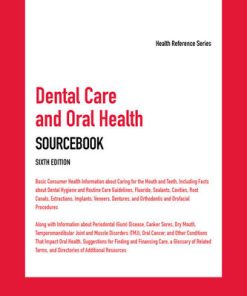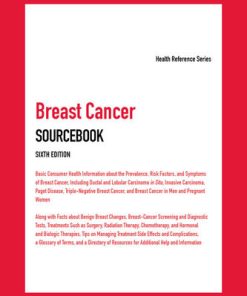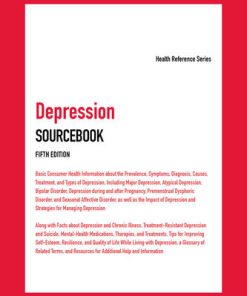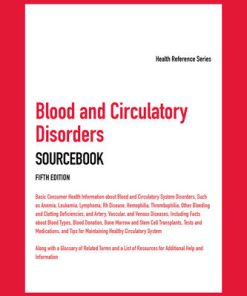(Ebook PDF) Learning Disabilities Sourcebook Health Reference 6th Edition by Angela Williams 0780817036 978-0780817036 full chapters
$50.00 Original price was: $50.00.$25.00Current price is: $25.00.
Learning Disabilities Sourcebook (Health Reference) 6th Edition by Angela L. Williams – Ebook PDF Instant Download/DeliveryISBN: 0780817036, 978-0780817036
Full download Learning Disabilities Sourcebook (Health Reference) 6th Edition after payment.
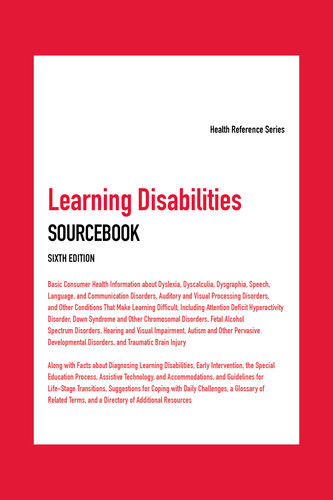
Product details:
ISBN-10 : 0780817036
ISBN-13 : 978-0780817036
Author : Angela L. Williams
Provides basic consumer health information about the signs, symptoms, and diagnosis of various learning disabilities and other conditions that impact learning, along with facts about early intervention and the special education process, advice for coping at home and school, and handling the transition to adulthood. Includes index, glossary of related terms, and other resources.
Learning Disabilities Sourcebook (Health Reference) 6th Table of contents:
Part One Understanding and Identifying Learning Disabilities
Chapter 1 The Brain and Its Function
Section 1.1—Brain Basics: How the Brain Works
Section 1.2—How the Brain Develops
Section 1.3—Executive Function
Chapter 2 Early Learning and Speech and Language Development Milestones
Section 2.1—Early Learning
Section 2.2—Speech and Language Development Milestones
Section 2.3—What Research Says about Language Acquisition
Chapter 3 Learning Disabilities Defined
Chapter 4 Causes of Learning Disabilities
Section 4.1—What Are the Causes and Risk Factors of Learning Disabilities?
Section 4.2—Environmental Contaminants and Learning Disabilities
Chapter 5 Signs and Symptoms of Learning Disabilities
Chapter 6 Diagnosing Learning Disabilities
Section 6.1—How Are Learning Disabilities Diagnosed?
Section 6.2—Evaluating Children for Learning Disabilities
Chapter 7 Prevalence of Learning Disabilities
Part Two Types of Learning Disabilities
Chapter 8 Auditory Processing Disorder
Chapter 9 Dyscalculia
Chapter 10 Dysgraphia
Chapter 11 Dyslexia
Section 11.1—Dyslexia Basics
Section 11.2—Dyslexia and the Brain: What Current Research Tells Us
Section 11.3—The READ Act Legislation on Dyslexia
Chapter 12 Gifted but Learning Disabled
Chapter 13 Nonverbal Learning Disability (NLD)
Chapter 14 Speech, Language, and Communication Disorders
Section 14.1—Delayed Speech or Language Development
Section 14.2—Apraxia of Speech
Chapter 15 Visual Processing Disorders
Part Three Other Disorders That Make Learning Difficult
Chapter 16 Aphasia
Chapter 17 Attention Deficit Hyperactivity Disorder (ADHD)
Section 17.1—About Attention Deficit Hyperactivity Disorder
Section 17.2—ADHD and Other Conditions
Chapter 18 Cerebral Palsy (CP)
Chapter 19 Chromosomal Disorders
Section 19.1—Down Syndrome
Section 19.2—47,XYY Syndrome
Section 19.3—Fragile X Syndrome (FXS)
Section 19.4—Klinefelter Syndrome (KS)
Section 19.5—Prader-Willi Syndrome (PWS)
Section 19.6—Triple X Syndrome
Section 19.7—Turner Syndrome
Section 19.8—22q11.2 Deletion Syndrome
Section 19.9—Williams Syndrome (WS)
Chapter 20 Emotional Disturbance
Chapter 21 Epilepsy
Chapter 22 Fetal Alcohol Spectrum Disorders (FASDs)
Section 22.1—Facts about Fetal Alcohol Spectrum Disorders
Section 22.2—Alcohol Use in Pregnancy
Section 22.3—Conditions Associated with FASD
Chapter 23 Gerstmann Syndrome
Chapter 24 Hearing Disabilities
Section 24.1—Facts about Hearing Disabilities
Section 24.2—Early Intervention and Special Education for Hearing Impairment
Section 24.3—Language and Communication Tools for Hearing Impairment
Chapter 25 Pervasive Developmental Disorders (PDD)
Section 25.1—Facts about Developmental Disabilities
Section 25.2—What Are Pervasive Development Disorders (PDD)?
Section 25.3—Autism Spectrum Disorder (ASD)
Section 25.4—Asperger Syndrome
Section 25.5—Rett Syndrome
Chapter 26 Specific Language Impairment
Chapter 27 Tourette Syndrome (TS)
Section 27.1—Tourette Syndrome: Overview
Section 27.2—Tourette Syndrome: Other Concerns and Conditions
Chapter 28 Traumatic Brain Injury (TBI)
Section 28.1—Basics of Traumatic Brain Injury
Section 28.2—Consequences of Traumatic Brain Injury
Chapter 29 Visual Impairment
Part Four Learning Disabilities and the Educational Process
Chapter 30 Decoding Learning Disabilities
Chapter 31 Understanding Your Child’s Right to Special Education Services
Section 31.1—Individuals with Disabilities Education Act (IDEA)
Section 31.2—Section 504
Section 31.3—Every Student Succeeds Act (ESSA)
Chapter 32 Early Intervention Strategies
Section 32.1—Early Intervention: An Overview
Section 32.2—Response to Intervention (RTI)
Chapter 33 Understanding the Special Education Process: An Overview
Chapter 34 Individualized Education Programs (IEPs)
Chapter 35 Supports, Modifications, and Accommodations for Students
Chapter 36 Specialized Teaching Techniques
Section 36.1—Differentiated Instruction
Section 36.2—The Inclusive Writing Classroom and Supportive Technology for Writing Problems
Section 36.3—Multisensory Teaching Techniques
Section 36.4—Speech-Language Therapy
Chapter 37 Coping with School-Related Challenges
Section 37.1—Building a Good Relationship with Your Child’s Teacher
Section 37.2—Parental Involvement in Child’s Success in School and Life
Chapter 38 Alternative Educational Options
Section 38.1—Homeschooling
Section 38.2—Choosing a Tutor
Chapter 39 Guide to Student Transition Planning
Part Five Living with Learning Disabilities
Chapter 40 Coping with a Learning Disability
Chapter 41 Family and Relationship Issues
Section 41.1—Caring for Siblings of Kids with Learning Disabilities
Section 41.2—Dealing with Learning Disabilities in Relationships
Section 41.3—Parenting Issues for Adults with Learning Disabilities
Chapter 42 Educating Others about Your Child with a Learning Disability
Chapter 43 Bullying and Learning Disabilities: What Parents Need to Know
Chapter 44 Social Skills: A Difficult Area for Many with Learning Disabilities
Chapter 45 Self-Esteem Issues and Children with Learning Disabilities.
Chapter 46 Life Skills for Teens and Young Adults with Learning Disabilities
Chapter 47 Transition to Adulthood
Section 47.1—Adult Transition Services
Section 47.2—Employment Services
Section 47.3—Independent Living
Chapter 48 Employment Issues for People with Learning Disabilities
Section 48.1—Youth with Learning Disabilities: The Challenges
Section 48.2—Meeting the Needs of Youth with LD in Workplace Programs
Section 48.3—Helping Your Child Choose a Career and Find a Job
Section 48.4—Tips for Disabled Job Seekers
Section 48.5—Learning Disabilities and Federal Government Employment
Chapter 49 Coaching for Adults with Learning Disabilities
Chapter 50 Special Needs Trusts
Part Six Additional Help and Information
Chapter 51 Glossary of Terms Related to Learning Disabilities
Chapter 52 Directory of Resources Related to Learning Disabilities
Chapter 53 Sources of College Funding for Students with Disabilities
People also search for Learning Disabilities Sourcebook (Health Reference) 6th:
learning disability issues
learning disability vs learning disorder
learning disabilities book
learning disabilities software programs
learning disabilities scholarly articles
Tags:
Learning Disabilities,Sourcebook,Health Reference,Angela Williams
You may also like…
Uncategorized
Medicine - Immunology
Education Studies & Teaching - School Education & Teaching
Learning Disabilities Sourcebook 6th Edition Angela L. Williams
Uncategorized



